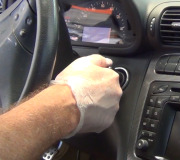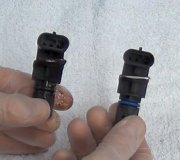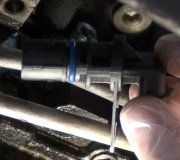Hi chuckbutler. Welcome to the forum. If you want relative reliability, keep your car. If you want guaranteed expensive, frequent repair bills, buy any new car.
What you're describing is typical of a leaking injector. My '88 Grand Caravan is doing the same thing but after a "hot soak" of up to a half hour the crank time is about five seconds. At 378,000 miles, it's been doing this for over ten years without causing a problem so I don't plan on doing anything about it.
Twenty seconds is excessive, but I have a suggestion that might help. What's happening is after stopping a hot engine, an injector dribbles fuel into the intake manifold where it vaporizes and causes a flooded condition upon start-up. That's where the rough running comes from. After the car sits long enough to cool down, the raw fuel condenses and isn't drawn into the engine until it is running.
The extended crank time, (cranking and turning over are the same thing. I think you're confusing "turning over" with starting and running), is due to fuel pressure bleeding off. The system should hold pressure for weeks but when it bleeds off, you have to crank the engine long enough for the electric pump to build up enough pressure to force fuel through the injectors. The pump only runs during cranking and for a few seconds after turning on the ignition switch. The way I proved a leaking injector is the cause of my extended crank time is when I know the problem will occur, I turn the ignition switch on, wait for at least one second, turn it off, wait for a few seconds, turn it on again, then crank the engine. Each time I turn the switch on, the fuel pump runs for one second. After a couple of seconds, there is enough pressure in the system for the injectors to work.
As a side note, GM is having a huge problem with "single cylinder misfires" on their '96 and newer cars with the "OBD2" emissions system that detects those things. It is due to their using perfectly fine injectors that are picked at random from their supply. When they have some that flow at different rates, some cylinders run a little lean and some might be a little rich. The Engine Computer sees the unburned oxygen in the exhaust and modifies fuel metering to all the cylinders to try to compensate for the lean cylinder(s). As a result, the other cylinders run too rich, but unburned fuel in the exhaust is not detected. Chrysler buys their injectors from Bosch and they are flow-matched at the factory to prevent these problems. It is almost unheard of to have a defective injector on a Chrysler product, but it is almost unheard of to have a GM car that doesn't develop injector trouble. I don't know the history of other brands of cars, only those two companies that are at the extremes of reliability. There are companies that rebuild injectors. One very reputable one is in Indianapolis. Many GM owners comment that their car never ran so smoothly until they had a matched set of injectors installed.
Caradiodoc
SPONSORED LINKS
Saturday, August 17th, 2019 AT 5:07 PM




